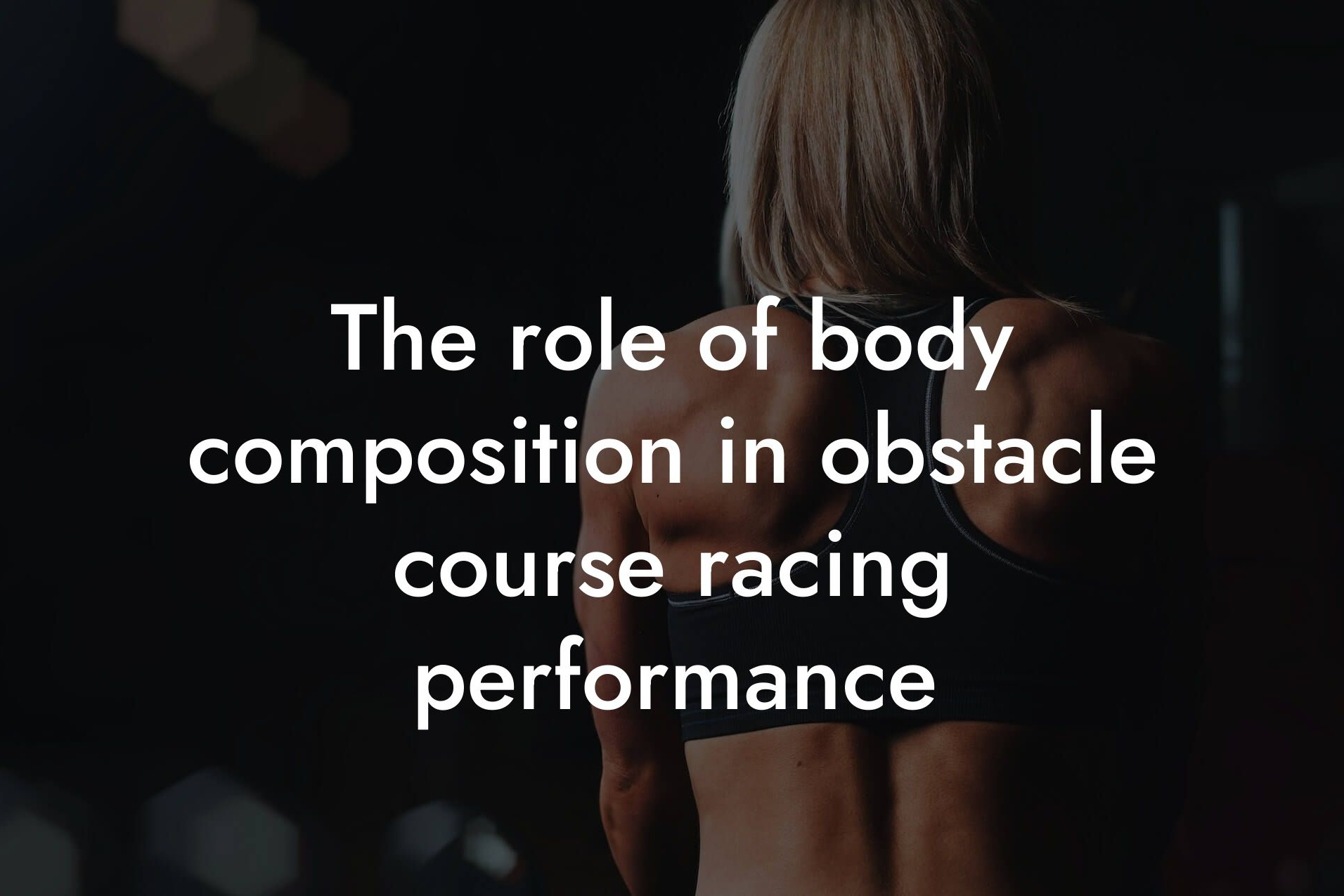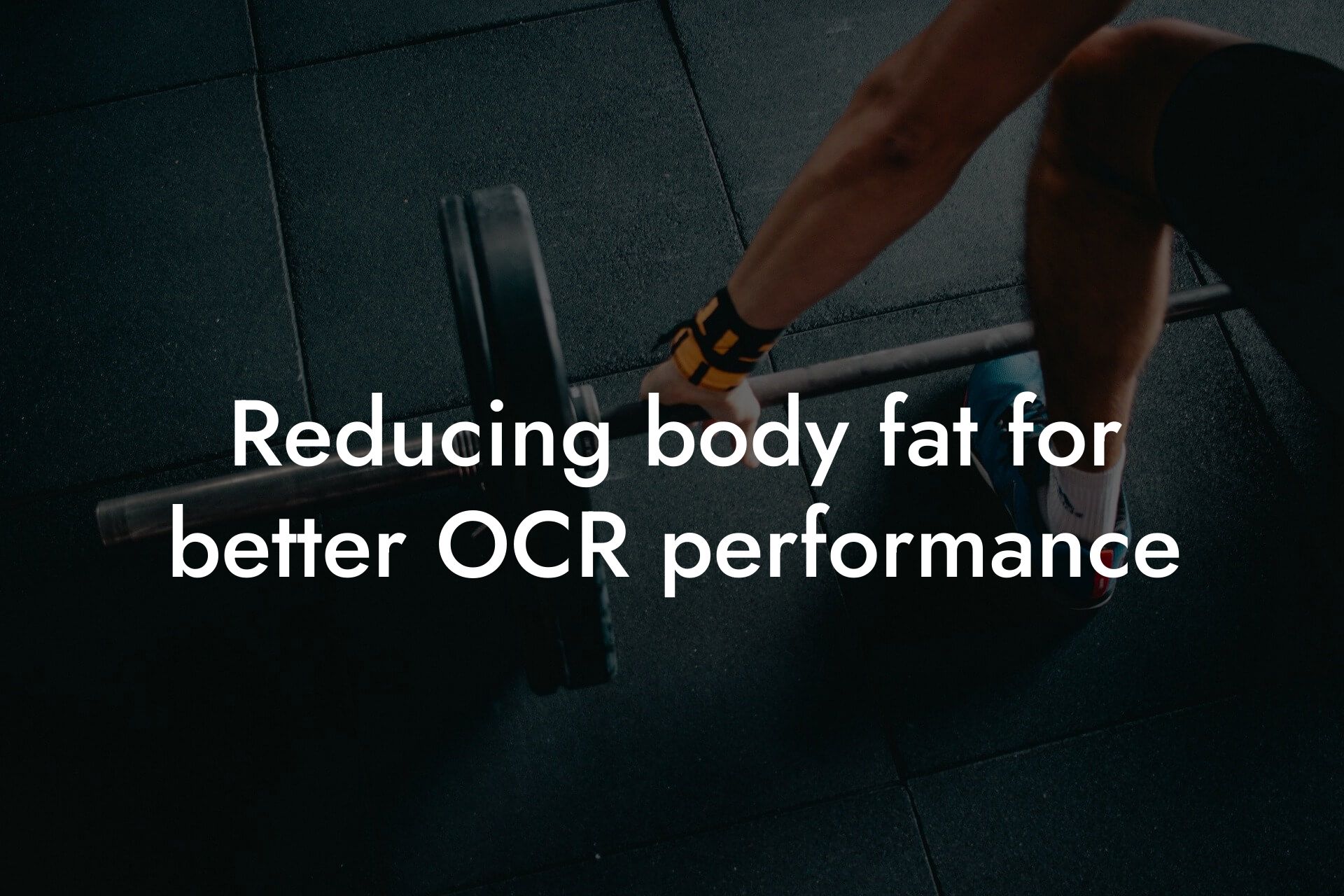As a high-earning professional, you understand the importance of maintaining a healthy and fit physique. Obstacle Course Racing (OCR) training is an excellent way to challenge yourself and improve your overall fitness. However, with intense training comes the risk of muscle fatigue and injury. In this article, we'll delve into the importance of muscle recovery and provide you with a comprehensive guide on how to maintain optimal muscle recovery with OCR training.
Table of Contents
- Why Muscle Recovery is Crucial for OCR Athletes
- Understanding the Phases of Muscle Recovery
- Nutrition and Supplementation for Muscle Recovery
- Hydration and Electrolyte Balance for Muscle Recovery
- Rest and Recovery Techniques for Muscle Recovery
- Incorporating DEXA Scans into Your Recovery Strategy
- Creating a Personalized Recovery Plan
- Frequently Asked Questions
Why Muscle Recovery is Crucial for OCR Athletes
Muscle recovery is a critical component of OCR training. When you engage in intense physical activity, your muscles undergo micro-tears, leading to inflammation and muscle soreness. If not properly addressed, this can lead to decreased performance, increased risk of injury, and prolonged recovery time. As an OCR athlete, it's essential to prioritize muscle recovery to maintain optimal performance and reduce the risk of injury.
Understanding the Phases of Muscle Recovery
Muscle recovery can be broken down into three distinct phases: acute, sub-acute, and chronic. Understanding these phases is crucial in developing an effective recovery strategy.
The acute phase occurs immediately after exercise and lasts for 1-2 hours. During this phase, your body is in a state of heightened inflammation, and your muscles are most receptive to nutrient uptake.
The sub-acute phase lasts for 2-48 hours and is characterized by a gradual decrease in inflammation and an increase in muscle repair.
The chronic phase occurs 48 hours after exercise and is marked by a return to normal muscle function. However, if not properly addressed, chronic inflammation can lead to prolonged recovery time and increased risk of injury.
Nutrition and Supplementation for Muscle Recovery
A well-planned nutrition and supplementation strategy is essential for optimal muscle recovery. During the acute phase, focus on consuming a mix of carbohydrates and protein within 30-60 minutes after exercise. This helps to replenish energy stores, reduce muscle damage, and promote muscle repair.
Some effective supplements for muscle recovery include:
- Protein powder: Helps to promote muscle repair and growth
- Creatine: Increases muscle strength and endurance
- Branched-Chain Amino Acids (BCAAs): Reduces muscle soreness and fatigue
- Omega-3 fatty acids: Reduces inflammation and promotes muscle recovery
Hydration and Electrolyte Balance for Muscle Recovery
Adequate hydration and electrolyte balance are critical for muscle recovery. During intense exercise, you lose electrolytes such as sodium, potassium, and magnesium, which can lead to muscle cramping, fatigue, and decreased performance.
To maintain optimal hydration and electrolyte balance:
- Drink at least 8-10 glasses of water per day
- Consume electrolyte-rich foods such as bananas, avocados, and nuts
- Use electrolyte supplements or tablets during and after exercise
Rest and Recovery Techniques for Muscle Recovery
Rest and recovery techniques are essential for muscle recovery. These techniques help to reduce muscle soreness, promote relaxation, and improve overall recovery.
Some effective rest and recovery techniques include:
- Foam rolling: Helps to reduce muscle soreness and improve circulation
- Massage therapy: Promotes relaxation, reduces muscle tension, and improves recovery
- Active recovery: Engage in low-intensity activities such as yoga, cycling, or swimming to promote blood flow and recovery
- Sleep and relaxation: Prioritize 7-9 hours of sleep per night and engage in relaxation techniques such as meditation or deep breathing
Incorporating DEXA Scans into Your Recovery Strategy
As an OCR athlete, it's essential to monitor your body composition and muscle mass to optimize your training and recovery. DEXA scans provide a comprehensive assessment of your body composition, including muscle mass, bone density, and body fat percentage.
By incorporating DEXA scans into your recovery strategy, you can:
- Monitor changes in muscle mass and body composition
- Identify areas for improvement in your training and nutrition
- Optimize your recovery strategy based on your individual needs
Creating a Personalized Recovery Plan
Every athlete is unique, and what works for one person may not work for another. Creating a personalized recovery plan tailored to your individual needs is crucial for optimal muscle recovery.
To create a personalized recovery plan:
- Consult with a healthcare professional or registered dietitian to develop a nutrition and supplementation strategy
- Incorporate rest and recovery techniques that work best for you
- Monitor your progress through DEXA scans and adjust your recovery plan accordingly
- Prioritize sleep, relaxation, and stress management to optimize recovery
Maintaining muscle recovery is crucial for OCR athletes. By understanding the phases of muscle recovery, prioritizing nutrition and supplementation, hydration and electrolyte balance, rest and recovery techniques, and incorporating DEXA scans into your recovery strategy, you can optimize your performance and reduce the risk of injury. Remember, a personalized recovery plan is key to achieving optimal muscle recovery. Consult with a healthcare professional or registered dietitian to develop a recovery plan tailored to your individual needs.
Frequently Asked Questions
What is OCR training and how does it relate to muscle recovery?
OCR stands for Obstacle Course Racing, a physically demanding sport that involves navigating various obstacles such as mud, walls, and barbed wire. As an OCR athlete, it's essential to prioritize muscle recovery to perform at your best and reduce the risk of injury. Muscle recovery is critical in OCR training as it allows your body to repair and adapt to the physical demands of the sport.
Why is muscle recovery important for OCR athletes?
Muscle recovery is crucial for OCR athletes as it enables them to perform at their best, reduce the risk of injury, and maintain overall physical health. When you don't allow your muscles to recover properly, you may experience fatigue, decreased performance, and increased risk of injury.
What are the consequences of poor muscle recovery in OCR training?
Poor muscle recovery can lead to a range of negative consequences, including decreased performance, increased risk of injury, fatigue, and burnout. Additionally, poor recovery can also impact your mental health, leading to anxiety, depression, and decreased motivation.
How does OCR training differ from traditional gym workouts?
OCR training is distinct from traditional gym workouts in that it involves functional movements, obstacle navigation, and varying terrain. This type of training requires a unique combination of strength, endurance, and agility, making it essential to prioritize muscle recovery to adapt to these demands.
What are the key components of a muscle recovery plan for OCR athletes?
A comprehensive muscle recovery plan for OCR athletes should include a combination of proper nutrition, hydration, stretching, foam rolling, compression garments, and adequate rest. Each of these components plays a critical role in promoting muscle recovery and reducing the risk of injury.
How does nutrition impact muscle recovery in OCR athletes?
Nutrition plays a critical role in muscle recovery, as it provides the necessary building blocks for muscle repair and growth. A balanced diet that includes protein, complex carbohydrates, and healthy fats is essential for OCR athletes to support muscle recovery.
What are the best foods for muscle recovery in OCR athletes?
The best foods for muscle recovery in OCR athletes include lean protein sources such as chicken, fish, and eggs, complex carbohydrates like brown rice, quinoa, and sweet potatoes, and healthy fats like nuts, seeds, and avocados. Additionally, foods rich in antioxidants like berries, leafy greens, and other fruits and vegetables can help reduce inflammation and promote recovery.
How much protein do OCR athletes need for muscle recovery?
OCR athletes require a significant amount of protein to support muscle recovery, with general recommendations ranging from 1.2-1.6 grams of protein per kilogram of body weight. This can be achieved through a combination of whole foods and supplements like protein powder.
What role does hydration play in muscle recovery for OCR athletes?
Hydration is critical for muscle recovery, as it helps to flush out waste products, reduce inflammation, and promote muscle function. OCR athletes should aim to drink at least 8-10 glasses of water per day, and make sure to drink water during and after exercise.
How can stretching and foam rolling aid in muscle recovery for OCR athletes?
Stretching and foam rolling are essential for muscle recovery, as they help to reduce muscle tension, improve circulation, and promote relaxation. These techniques can be used before and after exercise to improve flexibility, reduce muscle soreness, and promote recovery.
What are compression garments, and how do they aid in muscle recovery?
Compression garments are tight-fitting clothing that provides graduated compression to improve blood flow and reduce muscle soreness. They can be worn during and after exercise to aid in muscle recovery, improve circulation, and reduce inflammation.
How much rest and recovery time do OCR athletes need?
OCR athletes require adequate rest and recovery time to allow their muscles to repair and adapt. This can vary depending on the individual, but general recommendations include taking 1-2 rest days per week, and prioritizing sleep and relaxation to aid in recovery.
What are some common mistakes OCR athletes make when it comes to muscle recovery?
Common mistakes OCR athletes make when it comes to muscle recovery include neglecting proper nutrition, inadequate hydration, insufficient stretching and foam rolling, and inadequate rest and recovery time. These mistakes can lead to decreased performance, increased risk of injury, and burnout.
How can OCR athletes prioritize self-care and mental recovery?
OCR athletes can prioritize self-care and mental recovery by engaging in activities that bring them joy, practicing stress-reducing techniques like meditation and yoga, and setting realistic goals and expectations. Additionally, seeking support from coaches, teammates, and mental health professionals can be beneficial in promoting mental recovery.
What are some signs of overtraining and burnout in OCR athletes?
Signs of overtraining and burnout in OCR athletes include decreased performance, fatigue, insomnia, loss of appetite, and mood disturbances. If you're experiencing any of these symptoms, it's essential to prioritize rest and recovery, and seek support from coaches and healthcare professionals.
How can OCR athletes incorporate active recovery into their training?
Active recovery involves engaging in low-intensity exercise, such as yoga, cycling, or swimming, to promote blood flow and aid in muscle recovery. OCR athletes can incorporate active recovery into their training by including low-intensity exercises on rest days, or as a way to cross-train and reduce the risk of overuse injuries.
What role does sleep play in muscle recovery for OCR athletes?
Sleep is critical for muscle recovery, as it allows your body to repair and adapt to the physical demands of OCR training. OCR athletes should aim for 7-9 hours of sleep per night, and prioritize sleep as an essential component of their recovery plan.
How can OCR athletes use technology to aid in muscle recovery?
OCR athletes can use technology, such as wearable devices and recovery apps, to track their progress, monitor their recovery, and receive personalized recommendations for improvement. Additionally, technology can provide access to resources, such as online coaching and training programs, to aid in muscle recovery.
What are some common myths about muscle recovery in OCR training?
Common myths about muscle recovery in OCR training include the idea that more is better, that rest and recovery are a sign of weakness, and that muscle recovery is only necessary for elite athletes. These myths can lead to poor recovery habits, decreased performance, and increased risk of injury.
How can OCR athletes balance muscle recovery with other aspects of their life?
OCR athletes can balance muscle recovery with other aspects of their life by prioritizing their recovery, setting realistic goals and expectations, and seeking support from family, friends, and coaches. Additionally, finding activities that bring joy and fulfillment outside of OCR training can help to promote overall well-being and reduce the risk of burnout.
What are some additional resources for OCR athletes looking to improve their muscle recovery?
Additional resources for OCR athletes looking to improve their muscle recovery include online coaching and training programs, recovery apps, and educational resources like books and articles. Additionally, seeking support from healthcare professionals, such as physical therapists and sports dietitians, can provide personalized guidance and support.
Here are some related articles you might love...
- The role of body composition in obstacle course racing performance
- Reducing body fat for better OCR performance
- Strength training tips specific to obstacle course racing
- Nutrition strategies for sustained energy during OCR events
- The importance of bone density in OCR performance
- Preventing injuries in obstacle course racing: A comprehensive guide
- Improving agility and strength for obstacle course racing
- Balancing strength, speed, and endurance in OCR training
- Using DEXA scans to monitor progress in obstacle course training
Zak Faulkner
Zak Faulkner is a leading authority in the realm of physical health and body composition analysis, with over 15 years of experience helping professionals optimise their fitness and well-being. As one the experts behind Tano Performance Group, Zak has dedicated his career to providing in-depth, science-backed insights that empower clients to elevate their physical performance and overall health.
With extensive knowledge of DEXA technology, Zak specializes in delivering comprehensive body assessments that offer precise data on body fat, muscle mass, bone density, and overall physique. His expertise enables individuals to make informed decisions and achieve their fitness goals with accuracy and confidence. Zak’s approach is rooted in a deep understanding of human physiology, combined with a passion for helping clients unlock their full potential through personalised strategies.
Over the years, Zak has earned a reputation for his commitment to excellence, precision, and client-focused service. His guidance is trusted by top professionals who demand the best when it comes to their health. Whether advising on fitness programs, nutritional strategies, or long-term wellness plans, Zak Faulkner’s insights are a valuable resource for anyone serious about taking their health and fitness to the next level.
At Tano Performance Group, Zak continues to lead our Content Team revolutionising how professionals approach their physical health, offering unparalleled expertise that drives real results.




